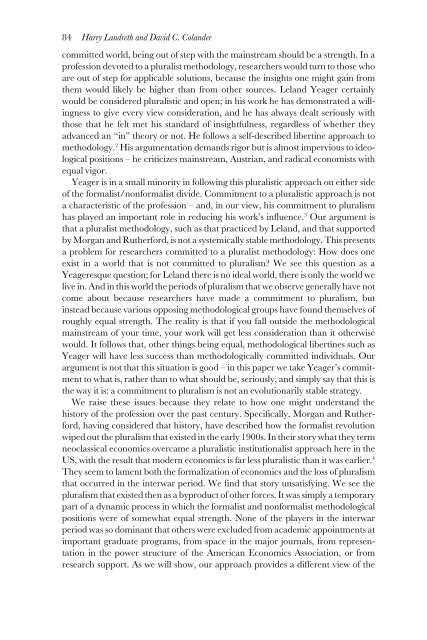Money and Markets: Essays in Honor of Leland B. Yeager
Money and Markets: Essays in Honor of Leland B. Yeager
Money and Markets: Essays in Honor of Leland B. Yeager
You also want an ePaper? Increase the reach of your titles
YUMPU automatically turns print PDFs into web optimized ePapers that Google loves.
84 Harry L<strong>and</strong>reth <strong>and</strong> David C. Col<strong>and</strong>ercommitted world, be<strong>in</strong>g out <strong>of</strong> step with the ma<strong>in</strong>stream should be a strength. In apr<strong>of</strong>ession devoted to a pluralist methodology, researchers would turn to those whoare out <strong>of</strong> step for applicable solutions, because the <strong>in</strong>sights one might ga<strong>in</strong> fromthem would likely be higher than from other sources. Lel<strong>and</strong> <strong>Yeager</strong> certa<strong>in</strong>lywould be considered pluralistic <strong>and</strong> open; <strong>in</strong> his work he has demonstrated a will<strong>in</strong>gnessto give every view consideration, <strong>and</strong> he has always dealt seriously withthose that he felt met his st<strong>and</strong>ard <strong>of</strong> <strong>in</strong>sightfulness, regardless <strong>of</strong> whether theyadvanced an “<strong>in</strong>” theory or not. He follows a self-described libert<strong>in</strong>e approach tomethodology. 2 His argumentation dem<strong>and</strong>s rigor but is almost impervious to ideologicalpositions – he criticizes ma<strong>in</strong>stream, Austrian, <strong>and</strong> radical economists withequal vigor.<strong>Yeager</strong> is <strong>in</strong> a small m<strong>in</strong>ority <strong>in</strong> follow<strong>in</strong>g this pluralistic approach on either side<strong>of</strong> the formalist/nonformalist divide. Commitment to a pluralistic approach is nota characteristic <strong>of</strong> the pr<strong>of</strong>ession – <strong>and</strong>, <strong>in</strong> our view, his commitment to pluralismhas played an important role <strong>in</strong> reduc<strong>in</strong>g his work’s <strong>in</strong>fluence. 3 Our argument isthat a pluralist methodology, such as that practiced by Lel<strong>and</strong>, <strong>and</strong> that supportedby Morgan <strong>and</strong> Rutherford, is not a systemically stable methodology. This presentsa problem for researchers committed to a pluralist methodology: How does oneexist <strong>in</strong> a world that is not committed to pluralism? We see this question as a<strong>Yeager</strong>esque question; for Lel<strong>and</strong> there is no ideal world, there is only the world welive <strong>in</strong>. And <strong>in</strong> this world the periods <strong>of</strong> pluralism that we observe generally have notcome about because researchers have made a commitment to pluralism, but<strong>in</strong>stead because various oppos<strong>in</strong>g methodological groups have found themselves <strong>of</strong>roughly equal strength. The reality is that if you fall outside the methodologicalma<strong>in</strong>stream <strong>of</strong> your time, your work will get less consideration than it otherwisewould. It follows that, other th<strong>in</strong>gs be<strong>in</strong>g equal, methodological libert<strong>in</strong>es such as<strong>Yeager</strong> will have less success than methodologically committed <strong>in</strong>dividuals. Ourargument is not that this situation is good – <strong>in</strong> this paper we take <strong>Yeager</strong>’s commitmentto what is, rather than to what should be, seriously, <strong>and</strong> simply say that this isthe way it is: a commitment to pluralism is not an evolutionarily stable strategy.We raise these issues because they relate to how one might underst<strong>and</strong> thehistory <strong>of</strong> the pr<strong>of</strong>ession over the past century. Specifically, Morgan <strong>and</strong> Rutherford,hav<strong>in</strong>g considered that history, have described how the formalist revolutionwiped out the pluralism that existed <strong>in</strong> the early 1900s. In their story what they termneoclassical economics overcame a pluralistic <strong>in</strong>stitutionalist approach here <strong>in</strong> theUS, with the result that modern economics is far less pluralistic than it was earlier. 4They seem to lament both the formalization <strong>of</strong> economics <strong>and</strong> the loss <strong>of</strong> pluralismthat occurred <strong>in</strong> the <strong>in</strong>terwar period. We f<strong>in</strong>d that story unsatisfy<strong>in</strong>g. We see thepluralism that existed then as a byproduct <strong>of</strong> other forces. It was simply a tem porarypart <strong>of</strong> a dynamic process <strong>in</strong> which the formalist <strong>and</strong> nonformalist methodologicalpositions were <strong>of</strong> somewhat equal strength. None <strong>of</strong> the players <strong>in</strong> the <strong>in</strong>terwarperiod was so dom<strong>in</strong>ant that others were excluded from academic appo<strong>in</strong>tments atimportant graduate programs, from space <strong>in</strong> the major journals, from representation<strong>in</strong> the power structure <strong>of</strong> the American Economics Association, or fromresearch support. As we will show, our approach provides a different view <strong>of</strong> the
















